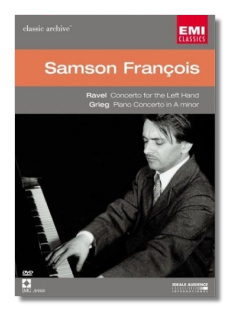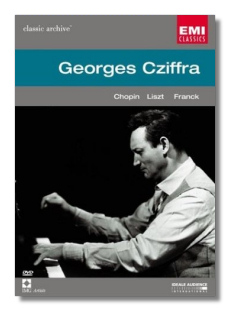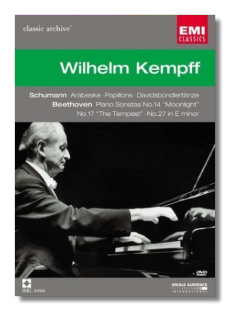
The Internet's Premier Classical Music Source
Related Links
-
Bartók Reviews
Beethoven Reviews
Chopin Reviews
Franck Reviews
Grieg Reviews
Liszt Reviews
Ravel Reviews
Schumann Reviews - Latest Reviews
- More Reviews
-
By Composer
-
Collections
DVD & Blu-ray
Books
Concert Reviews
Articles/Interviews
Software
Audio
Search Amazon
Recommended Links
Site News
 DVD Review
DVD Review
Classic Archive

- Maurice Ravel: Concerto for the Left Hand for Piano & Orchestra
- Edvard Grieg: Piano Concerto in A minor, Op. 16
- Frédéric Chopin: Préludes, Op. 28 #8, 6, and 24 *
Samson François, piano
* Maurizio Pollini, piano
Orchestre National de l'Opéra de Monte-Carlo/Louis Frémaux (Ravel)
Orchestre National de l'ORTF/Louis Frémaux (Grieg)
EMI Classics DVD 90438-9 Full Screen 56:31 PCM Mono


- Frédéric Chopin:
- Polonaise in A Flat Major, Op. 53 "Heroic"
- Scherzo #2 in B Flat minor, Op. 31
- Impromptu in G Flat Major, Op. 51
- Franz Liszt:
- Étude d'exécution transcendante in F minor, S. 139, #10
- Hungarian Rhapsody #6, S. 244
- Gnomenreigen, S. 145, #2
- Valse-Impromptu, S. 213
- Grand Galop chromatique, S. 219
- César Franck: Variations symphoniques
- Wagner/Liszt: Tannhäuser: Overture *
Georges Cziffra, piano
* Benno Moiseiwitsch, piano
Orchestre National de l'ORTF/Georges Cziffra, Jr.
EMI Classics DVD 90682-9 Full Screen 77:32 PCM Mono


- Robert Schumann:
- Arabeske in C minor, Op. 18
- Papillons, Op. 2
- Davidsbündlertänze, Op. 6
- Novelletten, Op. 21 #1 *
- Ludwig van Beethoven:
- Piano Sonata #17 in D minor, Op. 31, #2 "Tempest"
- Piano Sonata #14 in C Sharp minor, Op. 27, #2 "Moonlight"
- Piano Sonata #27 in E minor, Op. 90
- Béla Bartók: Out of Doors: Sz 81, #4 and 5 *
Wilhelm Kempff, piano
* Dino Ciani, piano
EMI Classics DVD 90448-9 Full Screen 77:32 PCM Mono
The current batch of DVD releases in the Classic Archive series contains the work of three pianists – two eccentric super-virtuosos (François and Cziffra), and a paragon of reason and dignity. The François disc opens with a volatile account of Ravel's Concerto for Left Hand, a work associated with this pianist. This is concert footage from October 24, 1964, recorded in the Salle Pleyel in Paris. The visual component is murky, but the monaural sound is clear and easy to listen to. It is fun to contrast Frémaux's visually charismatic conducting style with the limited facial expressions of François, particularly because these two these men made sounds that were completely in contrast with their appearances! The same holds true for the Grieg, recorded three years later, and just three years before the pianist's untimely death at the age of 46. Here, the visuals are more clear, and it is the sound that has become a little murky, but not to the point of distraction. Both concertos present François at his most typical: quirky, illuminating, and surprising. The manifold tempo changes and kittenish touch at the start of Grieg's concerto are typical. As a bonus, we are offered a very young Maurizio Pollini playing three Chopin Preludes in a Paris studio. Despite his youth, the characteristics of the mature Pollini are already present: fine control, beautiful legato, and, in the last prelude, a stubborn refusal to surrender himself outright to the music's revolutionary spirit. His facial expressions, however, are almost as beautiful as his playing.
Like François, Georges Cziffra (born György Cziffra in Budapest on November 5, 1921) stirred up controversy. Some thought he was the reincarnation of Franz Liszt. Others thought he was a superficial pounder. Where power and speed were concerned, few pianists from the past century had a technique to match his. When the music he played celebrated pianistic technique taken to the ultimate level, he was in his element. No wonder it is for his Liszt that he is best remembered. This DVD gives up a healthy sampling of Cziffra's Liszt in a concert film from 1961 and a studio film from 1963. It is hard not to be carried away by the madness of the Grand galop chromatique or by the arrogance (in the best possible sense of the word) of the Sixth Hungarian Rhapsody. Gnomenreigen is a lesson in agility and clarity. Cziffra's genial personality is never banished, however – this is virtuosity with a "face." The studio films, in spite of the naïve camerawork, devote much time to the pianist's hands, which will be a bonus for students, and for those who simply wonder "how he did it." The Franck Symphonic Variations come from 1965, and feature Cziffra's son – so young! – on the podium. At first, Dad seems a bit disconnected from the music, but as the performance progresses he brings out more and more of its colors and its excitement. All of the above material still looks and sounds more than acceptable. The Moiseiwitsch "bonus," on the other hand, looks and sounds dim, but the charisma with which the older pianist bounds through Liszt's arrangement of the Tannhäuser Overture carries one through. (This was filmed in BBC's studios in 1954.)
At least on the surface, Wilhelm Kempff projected solidity and conservatism. His Beethoven and Schubert sonata cycles remain excellent choices on CD, and his Schumann, also generously recorded by Deutsche Grammophon, still is a good first choice for collectors of any age. He was the Alfred Brendel of his generation. Most of the material on this DVD was recorded at the studios of ORTF – the national radio and television network of France. Arabeske and Papillons come from 1961, the "Tempest" Sonata from 1968, and the other two Beethoven sonatas (in color!) from 1970. (The Davidsbündlertänze were recorded at Besançon in 1963.) The Schumann is poetic but always masculine – not aggressive! – and full of nuance and subtlety. His Beethoven is mature, with nothing of the circus about it. Unlike François and Cziffra, Kempff's technique never called attention to itself. It definitely got the job done, however. There's nothing occluded about the harmonies and the inner lines, nothing mushy about the rhythms. Unfortunately, the first portion of the "Tempest" is missing. (To compensate, we get several shots of young French women looking very pensive as they hear Kempff's performance.) The camerawork is mostly good, with many hand shots of the pianist, and the sound is very acceptable. The bonus is given to Dino Ciani, the young Italian pianist who died in a car accident when was only 33. The Schumann and Bartók excerpts were recorded in 1967, seven years before his death. He's a much more physical pianist than Kempff, and very exciting to see and hear.
Copyright © 2004, Raymond Tuttle


















